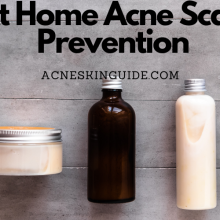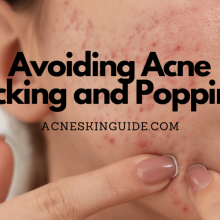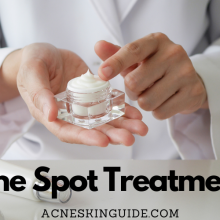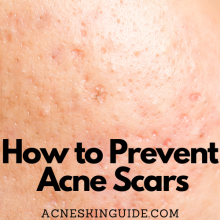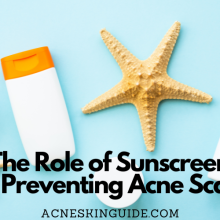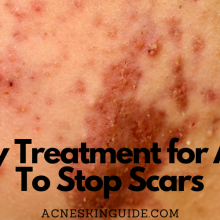Acne Scar Prevention – Tips from Dermatologists | AcneSkinGuide
Summary of Acne Scar Prevention
Acne scarring can severely impact self-confidence, making prevention crucial. Understanding scarring causes like inflammation during acne healing is key. Dermatologists recommend promptly treating active acne with retinoids, benzoyl peroxide, or oral medications to minimize skin damage. Avoiding pimple picking, using gentle products, and professional extraction techniques also help. Natural remedies like tea tree oil show promise, while anti-inflammatory diets and stress management provide supplemental benefits.
Consistent skincare routines with cleansing, exfoliation, spot treatments, and sun protection are vital. For severe scarring, procedures like chemical peels, laser treatments, and microneedling may be needed, though costly. Being proactive through early intervention, following expert advice patiently and consistently is emphasized. While challenging, a multi-faceted approach combining skincare, lifestyle, and professional treatments under dermatologist guidance offers the best chance at minimizing acne scar formation.

Acne Scar Prevention: Dermatologist-Approved Strategies
Acne can be a frustrating and stubborn skin condition, but one of the most distressing aspects is the potential for permanent scarring. Acne scars can take a toll on self-confidence and esteem, which is why it’s crucial to prioritize prevention. While acne scars are not always avoidable, following expert-recommended strategies can significantly minimize the risk of scarring and promote smoother, clearer skin.
Understanding Acne Scarring
Before delving into prevention methods, it’s essential to understand the causes and types of acne scars. Acne scars are the result of inflammation and damage to the skin during the healing process of acne lesions. This damage can lead to the formation of various scar types:
- Atrophic (depressed) scars: These include ice-pick scars (deep, narrow pits), boxcar scars (broad depressions with distinct edges), and rolling scars (broad depressions with smooth edges).
- Hypertrophic (raised) scars: These are thick, raised scars that may be red or discolored.
Certain risk factors can increase one’s susceptibility to scarring, such as severe acne, delayed treatment, skin picking/squeezing, genetics, and skin type (individuals with darker skin tones may be more prone to hyperpigmentation and keloid scarring).
Dermatologist-Recommended Tips for Prevention
Dermatologists emphasize the importance of seeking prompt treatment for active acne as the primary strategy for preventing scarring. Early intervention can help control inflammation and minimize damage to the skin.
Recommended acne treatments may include:
- Topical retinoids (vitamin A derivatives like tretinoin or adapalene)
- Benzoyl peroxide
- Salicylic acid
- Oral medications like antibiotics or isotretinoin (for severe cases)
It’s crucial to avoid picking or popping pimples, as this can lead to further inflammation and increase the risk of scarring. Using gentle, non-irritating skincare products and following proper extraction techniques (if performed by a professional) can also help prevent scarring.
Downside: Some acne medications, particularly retinoids and oral isotretinoin, can cause side effects like dryness, irritation, and sun sensitivity, which may require adjustments or additional steps in one’s skincare routine.
Natural Remedies and Lifestyle Factors
For those seeking natural alternatives, several remedies show promise in preventing acne scars. Tea tree oil, aloe vera, and honey possess antimicrobial and anti-inflammatory properties that can aid in healing acne lesions. Other natural remedies like rosehip oil, frankincense, and lavender essential oils may also be beneficial, but it’s essential to patch test and dilute essential oils properly.
Incorporating anti-inflammatory and zinc-rich foods into one’s diet, such as fatty fish, nuts, and leafy greens, can also support skin health and the healing process. Managing stress levels is crucial, as stress can exacerbate acne and impede healing.
Downside: Natural remedies may not be as potent or effective as prescription treatments for severe or persistent acne, and some individuals may experience allergic reactions or sensitivities.
Consistent Skincare Routine
Developing a consistent skincare routine is vital for acne scar prevention. This should include gentle cleansing, exfoliation (chemical or physical), targeted spot treatments, moisturizing, and masking with scar-preventing ingredients. Serums or spot treatments containing ingredients like vitamin C, retinoids, or niacinamide can also be incorporated to promote collagen production and improve skin texture.
Sun protection is another essential step, as UV exposure can worsen scarring and lead to hyperpigmentation. For those who wear makeup, proper application and removal techniques are crucial to avoid clogging pores and exacerbating acne.
Downside: A comprehensive skincare routine can be time-consuming and expensive, and finding the right products may require trial and error.
Professional Treatments
For more severe cases or persistent scarring, professional treatments may be recommended by dermatologists. Chemical peels, laser treatments, and microneedling can improve skin texture and promote collagen production, reducing the appearance of scars. Dermal fillers can temporarily fill in atrophic scars, while subcision and punch excision are surgical procedures for treating rolling and ice-pick scars, respectively.
Downside: Professional treatments can be costly and may require multiple sessions for optimal results. Additionally, there is a risk of side effects or complications, such as temporary redness, swelling, or hyperpigmentation.
Proactive Measures and Patience
Being proactive is key to preventing acne scars. Early intervention at the first signs of acne, strictly following a dermatologist’s advice, and maintaining patience and consistency with treatments are crucial. Regular skin consultations with a dermatologist and keeping a skincare diary to identify potential triggers can also aid in the prevention process.
It’s important to have realistic expectations and remember that patience and consistency are essential throughout the process. Acne scar prevention and treatment can be a journey, and results may not be immediate.
Downside: Being proactive and consistent with treatments can be challenging, especially for individuals with busy lifestyles or those who struggle with adherence to skincare routines.
In conclusion, preventing acne scars requires a multi-faceted approach, combining skincare routines, lifestyle adjustments, and professional treatments when necessary. By following dermatologist-recommended tips and being proactive, the formation of acne scars can be minimized, leading to clearer, smoother skin. However, it’s essential to be aware of potential downsides, such as side effects, costs, and the time and commitment required. For those seeking qualified dermatologists, consulting reputable online resources or asking for recommendations can be helpful in finding the right professional guidance.
FAQs and Answers
Can birth control pills help prevent acne scarring?
Yes, birth control pills can potentially help prevent acne scarring in some individuals. Here’s how:
- Hormonal regulation: Birth control pills contain synthetic versions of the hormones estrogen and progestin. These hormones can help regulate the body’s natural hormonal fluctuations, which are often a contributing factor to acne breakouts.
- Reducing acne severity: By regulating hormones, birth control pills can reduce the production of excess sebum (oil) in the skin, which is a key factor in the development of acne lesions. Fewer and less severe acne lesions mean a lower risk of scarring from inflammation and damage to the skin.
- Anti-inflammatory effects: Some birth control pills have anti-inflammatory properties, which can help reduce the inflammation associated with acne lesions. Less inflammation means a lower likelihood of scarring during the healing process.
However, it’s important to note that the effectiveness of birth control pills in preventing acne scarring can vary from person to person, as individual hormonal factors and skin types play a role. Additionally, birth control pills may not be suitable for everyone due to potential side effects or other health considerations.
It’s recommended to consult with a dermatologist or gynecologist to determine if birth control pills are an appropriate option for managing acne and potentially preventing scarring, based on individual circumstances and medical history.
How effective are over-the-counter scar treatments for preventing acne scars?
Over-the-counter (OTC) scar treatments can be somewhat effective in preventing acne scars, but their efficacy is generally limited compared to prescription treatments and professional procedures. Here’s an overview of how effective OTC scar treatments may be:
- Moderately effective for minor scarring: OTC scar treatments containing ingredients like silicone, onion extract, vitamin E, or alpha hydroxy acids (AHAs) can help minimize the appearance of minor acne scars, such as shallow boxcar or rolling scars. However, they are less effective for deeper, more severe scarring.
- Limited impact on preventing new scars: Most OTC scar treatments are designed to improve the appearance of existing scars rather than prevent new ones from forming. To effectively prevent acne scarring, it’s crucial to treat active acne lesions promptly and properly.
- Variable results: The effectiveness of OTC scar treatments can vary significantly based on the specific product, ingredients, concentration, and individual skin types. Some people may see noticeable improvements, while others may not experience any significant changes.
- Adjunctive treatment: OTC scar treatments are generally most effective when used in conjunction with other acne treatments prescribed by a dermatologist, as well as proper skincare routines and sun protection.
- Professional guidance recommended: While OTC scar treatments can be a cost-effective option, it’s advisable to consult with a dermatologist for guidance on the most appropriate and effective products for your specific skin concerns and scar types.
Overall, while OTC scar treatments can be helpful for minor acne scarring, they may not be as effective as prescription treatments or professional procedures like chemical peels, laser treatments, or microneedling for preventing or minimizing more severe acne scarring.
Can LED light therapy help prevent acne scarring?
Yes, LED (light-emitting diode) light therapy can potentially help prevent acne scarring when used as part of an overall acne treatment plan. Here’s how LED light therapy may contribute to acne scar prevention:
- Anti-inflammatory effects: LED light therapy, particularly blue light wavelengths, has been shown to have anti-inflammatory properties. By reducing inflammation associated with acne lesions, it can minimize the risk of scarring during the healing process.
- Promotion of wound healing: Red and near-infrared LED light wavelengths can stimulate the production of collagen and elastin, which are important for proper wound healing and scar minimization.
- Destruction of acne-causing bacteria: Blue light therapy can also target and destroy acne-causing bacteria, such as Propionibacterium acnes, which can help prevent new acne lesions from forming and potentially scarring.
- Adjunctive treatment: LED light therapy is often used in combination with other acne treatments, such as topical medications, chemical peels, or prescription creams. This multi-pronged approach can be more effective in controlling acne and preventing scarring than using LED light therapy alone.
However, it’s important to note that LED light therapy is generally considered more effective for active acne management rather than treating existing acne scars. While it can help prevent new scars from forming, it may have limited impact on improving the appearance of existing scars.
Additionally, LED light therapy should be administered by a qualified professional, as improper use or exposure times can potentially lead to skin irritation or other side effects.
Overall, when used as part of a comprehensive acne treatment plan under the guidance of a dermatologist, LED light therapy can be a valuable tool in the prevention of acne scarring by reducing inflammation, promoting healing, and controlling acne-causing bacteria.
Are there any specific dietary supplements that can aid in acne scar prevention?
Yes, there are several dietary supplements that may aid in the prevention of acne scars when used in conjunction with other acne treatments and a healthy lifestyle. Here are some of the most commonly recommended supplements for acne scar prevention:
- Zinc: Zinc is an essential mineral that plays a crucial role in wound healing, collagen production, and reducing inflammation. Zinc supplements may help prevent acne scars by supporting the skin’s healing process and reducing the severity of acne lesions.
- Vitamin C: Vitamin C is a potent antioxidant that can help neutralize free radicals and reduce inflammation, both of which contribute to acne scarring. It also aids in collagen synthesis, which is important for proper wound healing and scar minimization.
- Omega-3 fatty acids: Supplements containing omega-3 fatty acids, such as fish oil or flaxseed oil, have anti-inflammatory properties that can help reduce the inflammation associated with acne lesions, potentially preventing scarring.
- Vitamin E: Vitamin E is another antioxidant that can help protect the skin from oxidative stress and promote wound healing. It may be beneficial in preventing acne scars when combined with other acne treatments.
- Probiotics: Some research suggests that probiotics may help regulate the skin’s microbiome and reduce inflammation, which could aid in the prevention of acne scarring.
It’s important to note that while dietary supplements may provide additional support, they should not be relied upon as the sole treatment for acne or scar prevention. They work best when combined with prescription acne medications, professional treatments, and a consistent skincare routine recommended by a dermatologist.
Additionally, it’s advisable to consult with a healthcare professional before starting any new dietary supplements, as some may interact with medications or have potential side effects, especially when taken in high doses.
How early should someone start taking preventive measures for acne scarring?
There is no definitive consensus on exactly when someone should start taking preventive measures for acne scarring, but most dermatologists recommend being proactive as early as possible. Here are some general guidelines on when to start taking steps to prevent acne scarring:
- At the first signs of acne: As soon as you notice the first few pimples or acne lesions, it’s a good idea to start implementing preventive measures. Early intervention can help control inflammation and minimize the risk of scarring before acne becomes more severe.
- During the teenage years: Many people experience their first bout of acne during puberty. Dermatologists often recommend starting preventive skincare routines and acne treatments around the age of 12-14, or as soon as acne begins to appear.
- Before acne becomes moderate to severe: If acne starts to progress from mild to moderate or severe, it’s crucial to seek professional help from a dermatologist and start preventive measures immediately. Severe acne poses a higher risk of scarring if left untreated.
- After the first acne scar appears: If you’ve already developed an acne scar, it’s important to start taking preventive measures right away to avoid the formation of additional scars.
The earlier preventive measures are taken, the better the chances of minimizing or avoiding acne scarring altogether. However, it’s never too late to start taking preventive steps, even if you’ve had acne for a while or have existing scars.
Preventive measures may include using appropriate acne medications (as prescribed by a dermatologist), following a consistent skincare routine, avoiding picking or squeezing pimples, managing stress, wearing sunscreen, and adopting a healthy lifestyle.
It’s important to remember that acne and scarring can be influenced by various factors, such as hormones, genetics, and skin type. Consulting with a dermatologist early on can help determine the most suitable and effective preventive approach for your specific circumstances.

